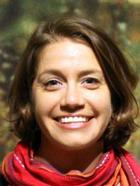Cultural, Cognitive, Experiential, and Attitudinal Influences on Computational Thinking Development
Description
Two STEM+C Projects (Evaluation of a Model Spatial Thinking Curriculum for Building Computational Skills in Elementary Grades K-5 (Spatial STEM+C) and Assessing Computational Thinking in Maker Activities (ACTMA)) will give short presentations of their work (see descriptions below), discuss similarities and challenges between the two projects and take questions from the audience.Attempting to Level the STEM Playing Field with Spatial Thinking Training in Elementary School
Presented by Steven Moore from Evaluation of a Model Spatial Thinking Curriculum for Building Computational Skills in Elementary Grades K-5 (Spatial STEM+C)
Spatial thinking skills are highly predictive of success in entering STEM fields such as computer science, engineering, biomedicine, environmental science, and geoscience. Spatial thinking training interventions in middle school, high school, and college have been shown to be effective in helping students develop stronger abilities and succeed in gatekeeping STEM subjects. Such training may improve students' STEM success by strengthening their computational thinking and mathematics skills. Since 2015, the NSF-funded Spatial STEM+C project has been exploring strategies for bringing such interventions to students earlier in their educational careers. In a comparison-group study, the project implemented spatial thinking activities with K-5 students at a local elementary school in concert with spatial thinking, computational thinking, and mathematical assessments. The goal was to identify how computational thinking and mathematical performance were influenced by the spatial thinking interventions. In this presentation, I will present preliminary results regarding the spatial thinking abilities of our study population; how such abilities varied by gender, grade level, participation in out-of-school activities, and other factors; and whether the spatial thinking interventions influenced students' computational thinking abilities and mathematical performance.
Computational Thinking, Making, and Cultural Responsiveness
Presented by Roxana Hadad from Assessing Computational Thinking in Maker Activities (ACTMA)
In this presentation, we will examine an 11-day summer program for a diverse group of high school students that focused on developing physics knowledge and skills in a makerspace. Students learned about electricity, conductivity, circuits, and sensors, all while incorporating computational thinking (CT). In order to be responsive to the students’ cultural experiences, they were asked to share elements of their identity through “show and tell”, collecting data on how they spend their time, asset maps, and other hands-on physics-based activities. From an analysis of observations, interviews, notebooks, and artifacts created by the students, we will discuss how valuing student identity and building community can highlight how CT and physics affect students’ lives. This work has important implications for acknowledging the role and importance of culture, prior knowledge, and interest in the development of CT skills and the design of both formal and informal learning environments for youth underrepresented in computing and STEM.




